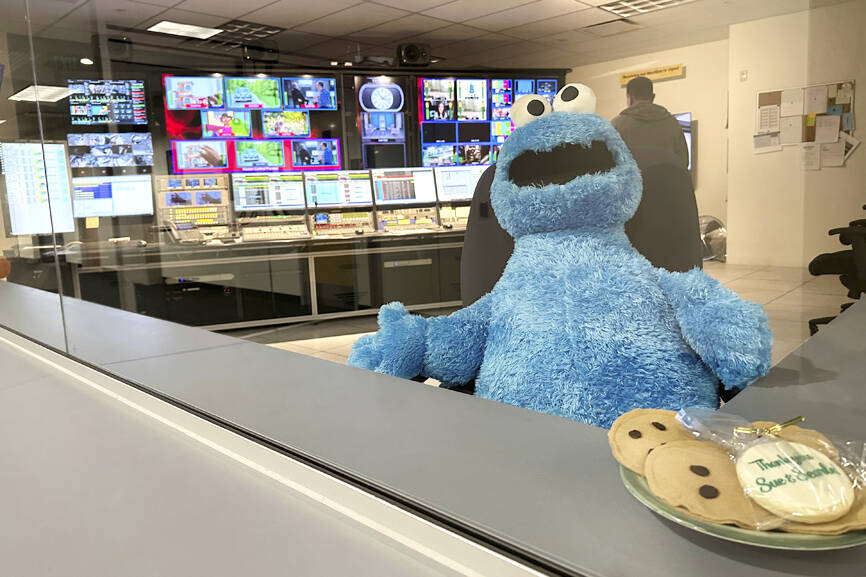The Corporation for Public Broadcasting (CPB), a cornerstone of US culture for three generations, announced on Friday that it would take steps toward its own closure after being defunded by US Congress — marking the end of a nearly six-decade era in which it fueled the production of renowned educational programming, cultural content and even emergency alerts.
The demise of CPB is a direct result of US President Donald Trump’s targeting of public media, which he has repeatedly said is spreading political and cultural views antithetical to those the US should be espousing. The closure is expected to have a profound impact on the journalistic and cultural landscape — in particular, public radio and TV stations in small communities across the US.
CPB helps fund both PBS and NPR, but most of its funding is distributed to more than 1,500 local public radio and television stations around the country.

Photo: AP
The corporation also has deep ties to much of the nation’s most familiar programming, from NPR’s All Things Considered to, historically, Sesame Street, Mister Rogers’ Neighborhood and the documentaries of Ken Burns.
The corporation said its end, 58 years after being signed into law by then-US president Lyndon B. Johnson, would come in an “orderly wind-down.”
In a statement, it said the decision came after the passage through Congress of a package that clawed back its funding for the next two budget years — about US$1.1 billion. Then, the Senate Appropriations Committee reinforced that policy change on Thursday by excluding funding for the corporation for the first time in more than 50 years as part of a broader spending bill.
“Despite the extraordinary efforts of millions of Americans who called, wrote, and petitioned Congress to preserve federal funding for CPB, we now face the difficult reality of closing our operations,” CPB president and CEO Patricia Harrison said.
Democratic members of the Senate Appropriations Committee made a last-ditch effort this week to save the CPB’s funding.
CPB said it informed employees on Friday that most staff positions would end with the fiscal year on Sept. 30.
Federal money for public radio and television has traditionally been appropriated to the CPB, which distributes it to NPR and PBS. Roughly 70 percent of the money goes directly to the 330 PBS and 246 NPR stations across the country, although that is only a shorthand way to describe its potential impact.
Trump, who has called the CPB a “monstrosity,” has long said that public broadcasting displays an extreme liberal bias, helped create the momentum in recent months for an anti-public broadcasting groundswell among his supporters in Congress and around the country.
It is part of a larger initiative targeting institutions — particularly cultural ones — that produce content or espouse attitudes that he considers “un-American.” The CPB’s demise represents a political victory for those efforts.
His impact on the media landscape has been profound. He has also gone after US government media that had independence charters, including the Voice of America, ending that media outlet’s operations after many decades.
Trump also fired three members of the corporation’s board of directors in April. In legal action at the time, the fired directors said their dismissal was governmental overreach targeting an entity whose charter guarantees it independence.

PARLIAMENT CHAOS: Police forcibly removed Brazilian Deputy Glauber Braga after he called the legislation part of a ‘coup offensive’ and occupied the speaker’s chair Brazil’s lower house of Congress early yesterday approved a bill that could slash former Brazilian president Jair Bolsonaro’s prison sentence for plotting a coup, after efforts by a lawmaker to disrupt the proceedings sparked chaos in parliament. Bolsonaro has been serving a 27-year term since last month after his conviction for a scheme to stop Brazilian President Luiz Inacio Lula da Silva from taking office after the 2022 election. Lawmakers had been discussing a bill that would significantly reduce sentences for several crimes, including attempting a coup d’etat — opening up the prospect that Bolsonaro, 70, could have his sentence cut to

China yesterday held a low-key memorial ceremony for the 1937 Nanjing Massacre, with Chinese President Xi Jinping (習近平) not attending, despite a diplomatic crisis between Beijing and Tokyo over Taiwan. Beijing has raged at Tokyo since Japanese Prime Minister Sanae Takaichi last month said that a hypothetical Chinese attack on Taiwan could trigger a military response from Japan. China and Japan have long sparred over their painful history. China consistently reminds its people of the 1937 Nanjing Massacre, in which it says Japanese troops killed 300,000 people in what was then its capital. A post-World War II Allied tribunal put the death toll

A passerby could hear the cacophony from miles away in the Argentine capital, the unmistakable sound of 2,397 dogs barking — and breaking the unofficial world record for the largest-ever gathering of golden retrievers. Excitement pulsed through Bosques de Palermo, a sprawling park in Buenos Aires, as golden retriever-owners from all over Argentina transformed the park’s grassy expanse into a sea of bright yellow fur. Dog owners of all ages, their clothes covered in dog hair and stained with slobber, plopped down on picnic blankets with their beloved goldens to take in the surreal sight of so many other, exceptionally similar-looking ones.

‘UNWAVERING ALLIANCE’: The US Department of State said that China’s actions during military drills with Russia were not conducive to regional peace and stability The US on Tuesday criticized China over alleged radar deployments against Japanese military aircraft during a training exercise last week, while Tokyo and Seoul yesterday scrambled jets after Chinese and Russian military aircraft conducted joint patrols near the two countries. The incidents came after Japanese Prime Minister Sanae Takaichi triggered a dispute with Beijing last month with her remarks on how Tokyo might react to a hypothetical Chinese attack on Taiwan. “China’s actions are not conducive to regional peace and stability,” a US Department of State spokesperson said late on Tuesday, referring to the radar incident. “The US-Japan alliance is stronger and more